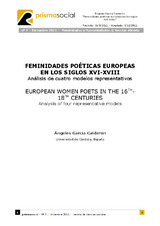Mostrar el registro sencillo del ítem
Feminidades poéticas europeas en los siglos XVI-XVIII: análisis de cuatro modelos representativos
| dc.contributor.author | García Calderón, Ángeles | |
| dc.date.accessioned | 2012-07-27T10:03:26Z | |
| dc.date.available | 2012-07-27T10:03:26Z | |
| dc.date.issued | 2011 | |
| dc.identifier.uri | http://hdl.handle.net/10396/7699 | |
| dc.description.abstract | El presente trabajo se centra en la práctica poética de las mujeres europeas que se rebelaron contra su condición social elevándose intelectualmente al mismo nivel de los hombres. Tras un breve repaso a la situación de la mujer escritora en Europa, se mencionan aquellas voces que expresaron su insurrección y desobediencia a las normas establecidas. Dado que resultaría imposible abarcar la totalidad de poetas de un período tan extenso, se han tomado cuatro autoras, de los ámbitos románico y anglosajón, como modelos representativos del Renacimiento al siglo XVIII: Gaspara Stampa, Louise Labé, Katherine Philips y Lady Mary Montagu. Estas autoras, como otras muchas, no lograron concitar sino el rechazo, no sólo del sexo contrario, sino del suyo propio que las consideró como mujeres indisciplinadas, negándoles incluso sus propios atributos femeninos, por el hecho de reivindicarlos del mismo modo que los hombres. | es_ES |
| dc.description.abstract | This article focuses on the poetic practice of European women who rebelled against their actual social condition while climbing up intellectually to the same level of men. After a brief introduction to the women writers‟ situation in Europe, we refer to those who would express their disobedience to the established rules and norms. As it would be impossible to review the work of all the relevant women poets in such a long period of time, four writers from the Romance and Anglo-Saxon linguistic areas have been chosen as representative models during the 16th-18th centuries: Gaspara Stampa, Louise Labé, Katherine Philips y Lady Mary Montagu. These poets, as many other, only achieved social disdain and rejection of the opposite sex as well as their own, as they considered them undisciplined women. They would be even negated their own female attributes simply for the fact of vindicating them as men did. | es_ES |
| dc.format.mimetype | application/pdf | es_ES |
| dc.language.iso | spa | es_ES |
| dc.publisher | Fundación iS+D para la Investigación Social Avanzada | es_ES |
| dc.rights | https://creativecommons.org/licenses/by-nc-nd/4.0/ | es_ES |
| dc.source | Prisma Social, revista de ciencias sociales 7, 1-26 (2011) | es_ES |
| dc.subject | Feminismo | es_ES |
| dc.subject | Poesía | es_ES |
| dc.subject | Lenguas romances | es_ES |
| dc.subject | Inglés (Lengua) | es_ES |
| dc.subject | Traducción poética | es_ES |
| dc.subject | Feminism | es_ES |
| dc.subject | Poetry | es_ES |
| dc.subject | Romance languages | es_ES |
| dc.subject | English | es_ES |
| dc.subject | Poetic translation | es_ES |
| dc.title | Feminidades poéticas europeas en los siglos XVI-XVIII: análisis de cuatro modelos representativos | es_ES |
| dc.title.alternative | European women poets in the 16th-18th centuries: analysis of four representative models | es_ES |
| dc.type | info:eu-repo/semantics/article | es_ES |
| dc.rights.accessRights | info:eu-repo/semantics/openAccess | es_ES |

